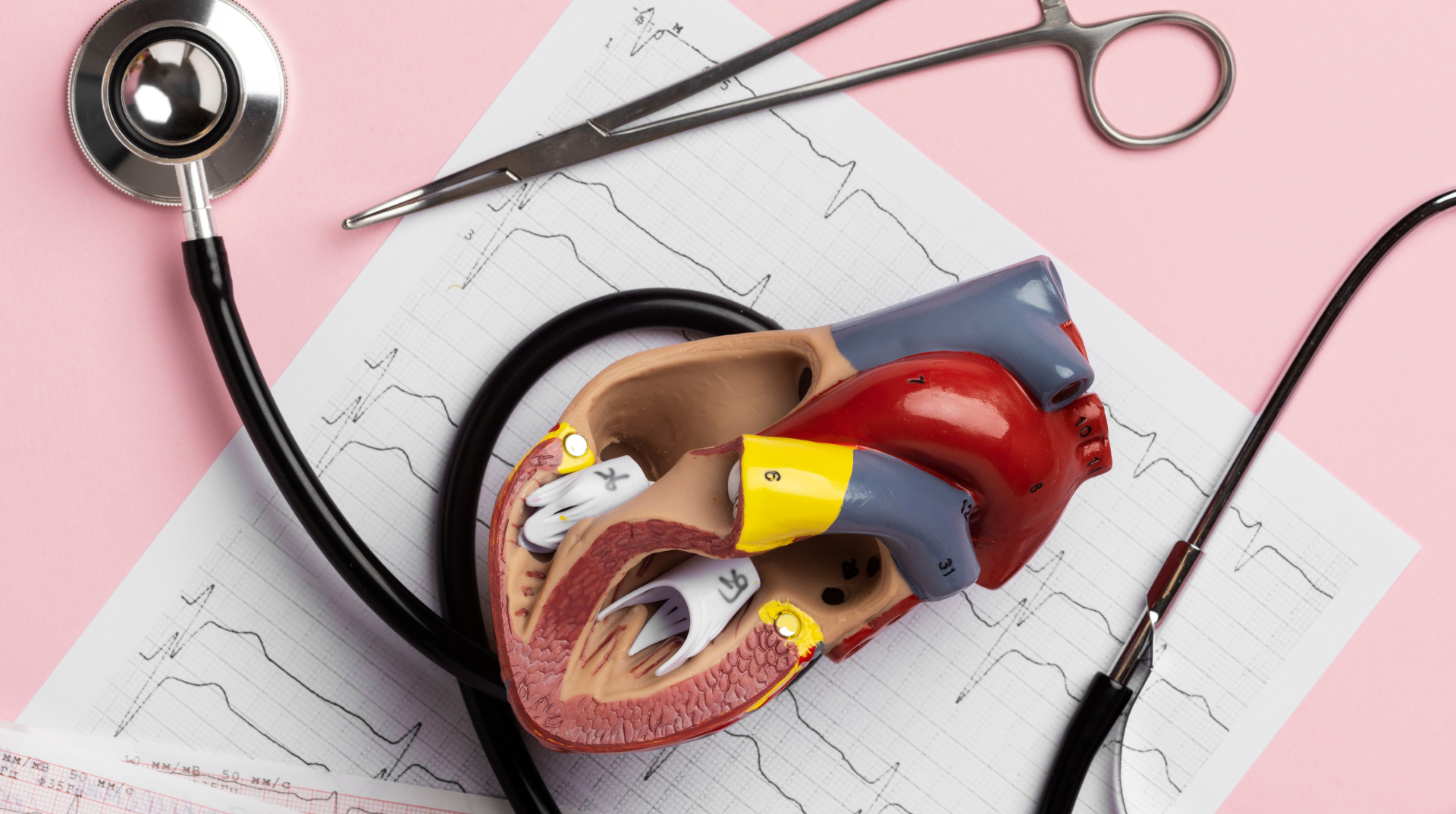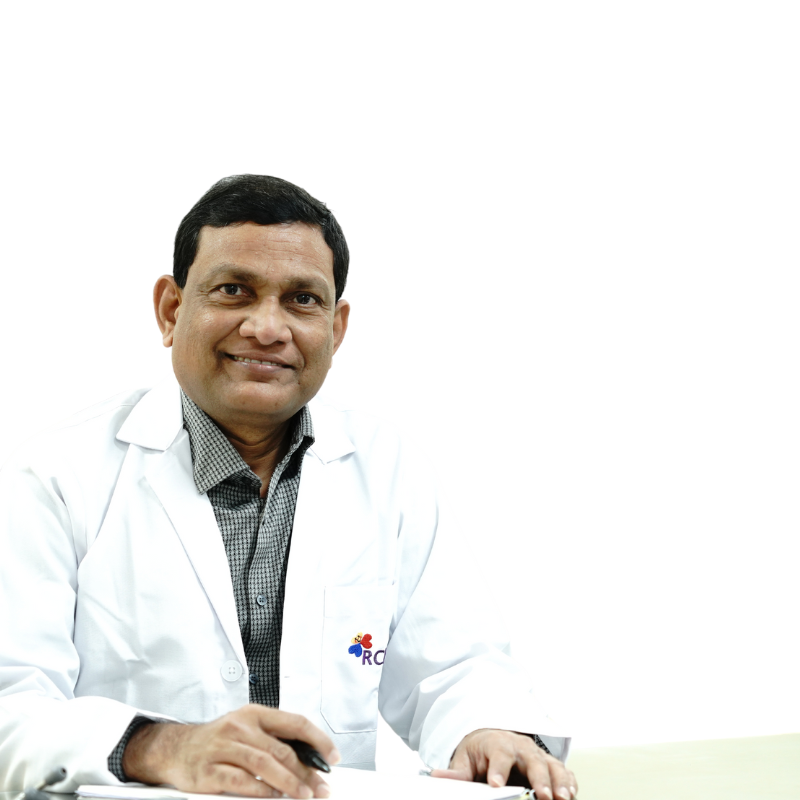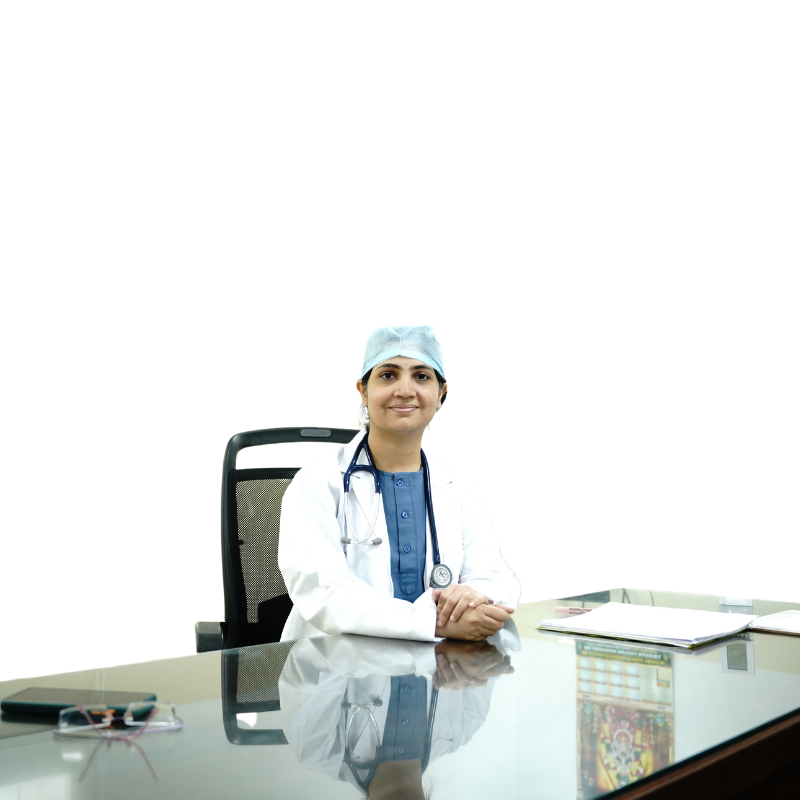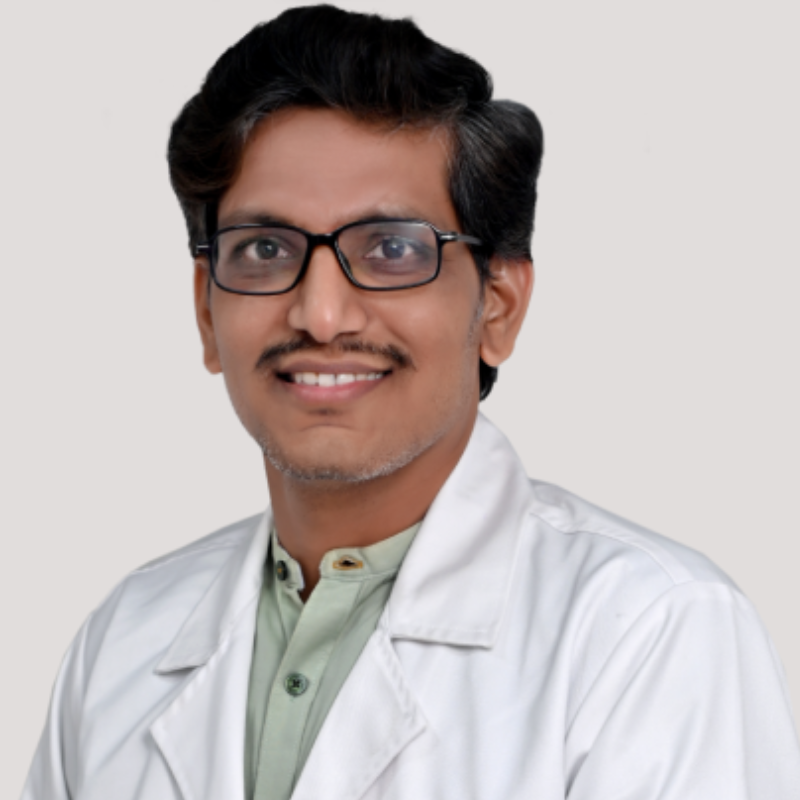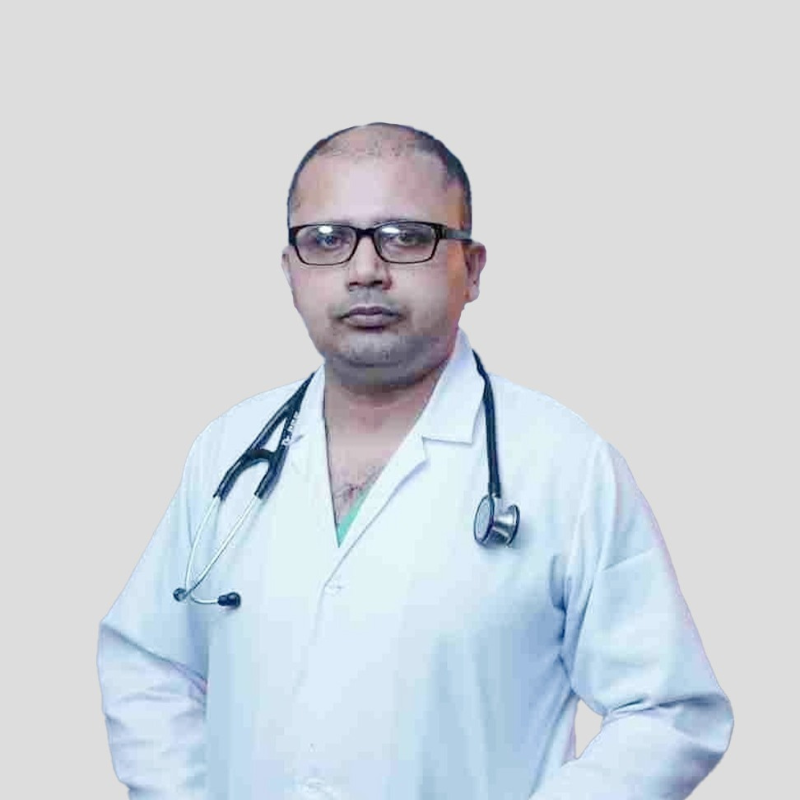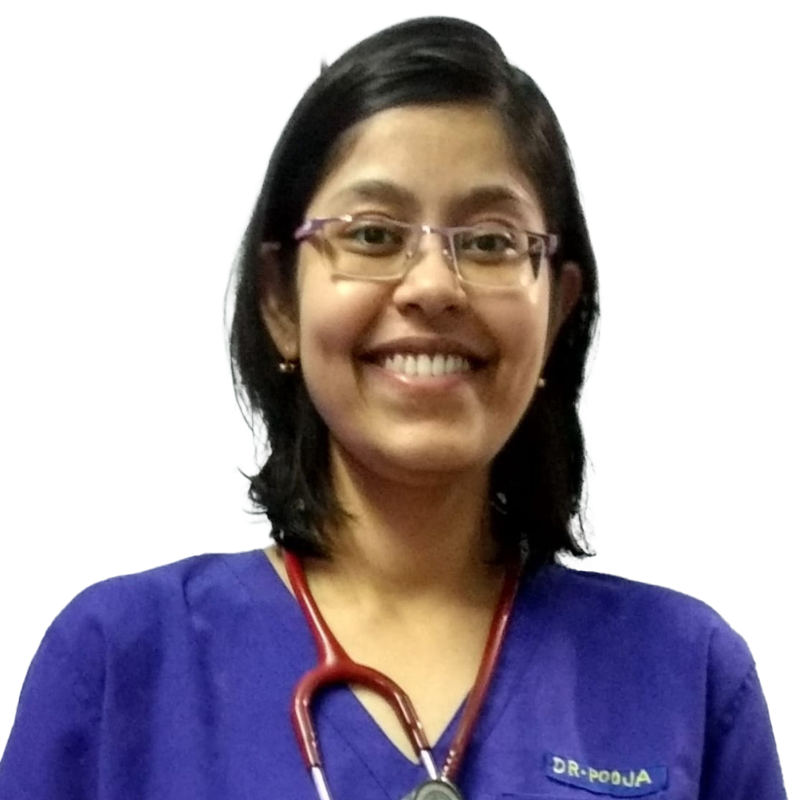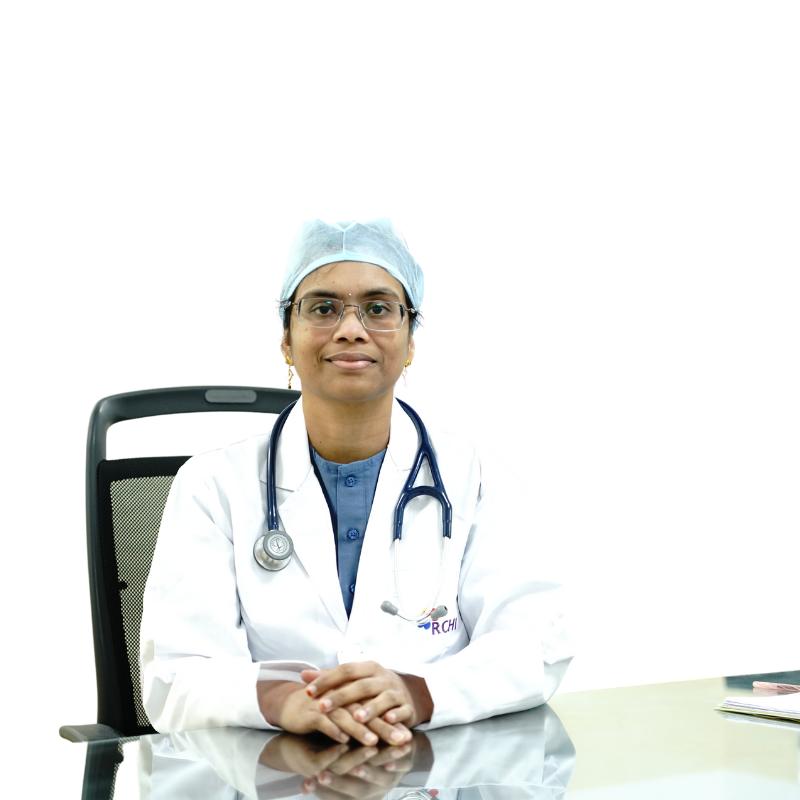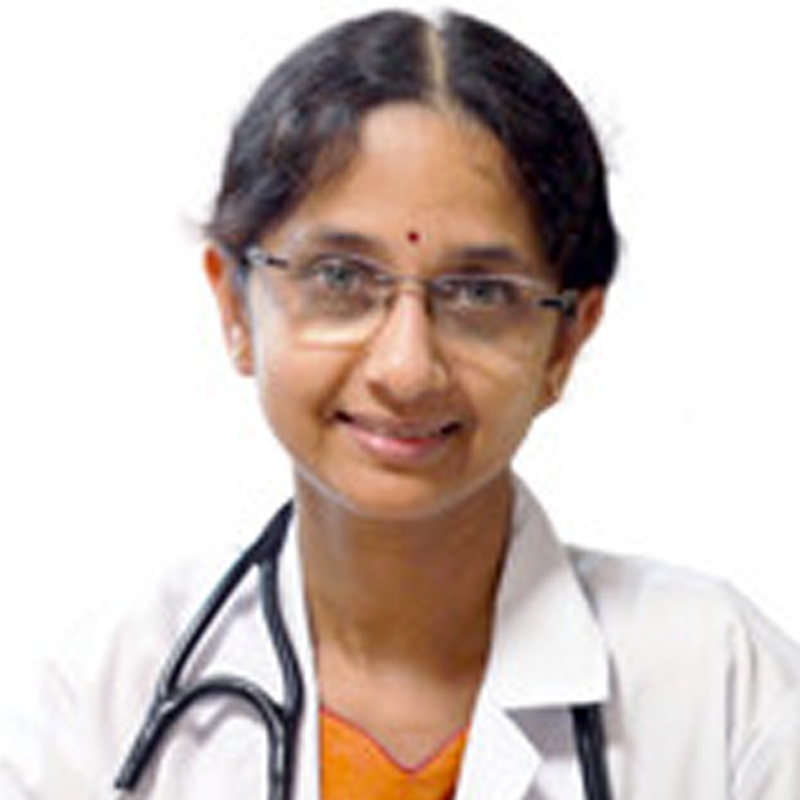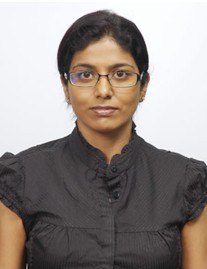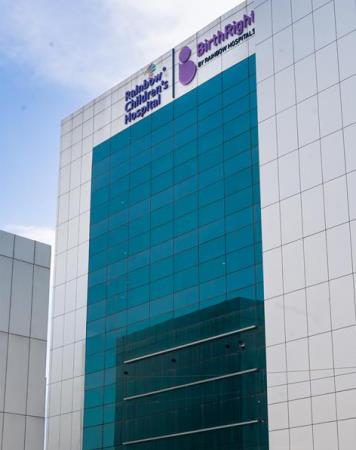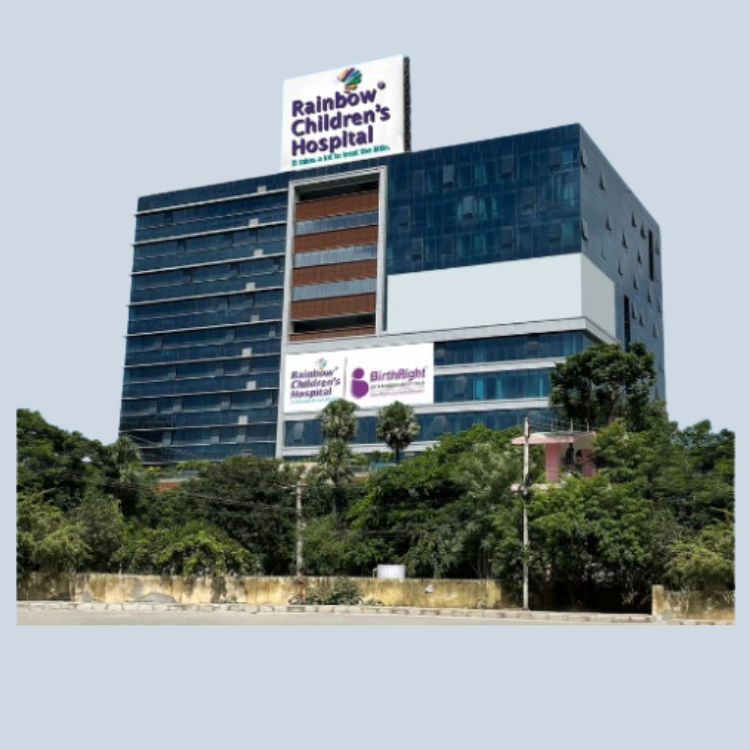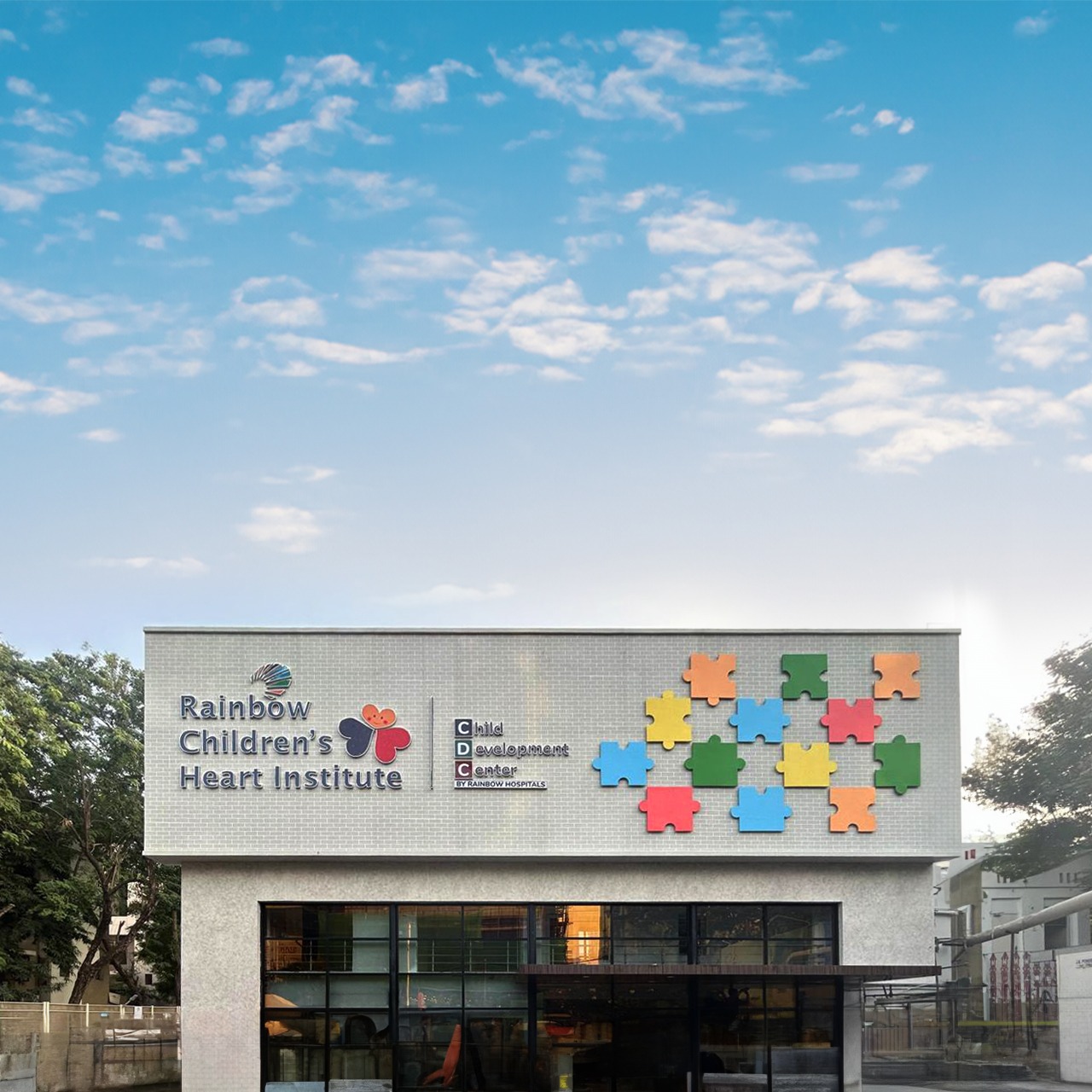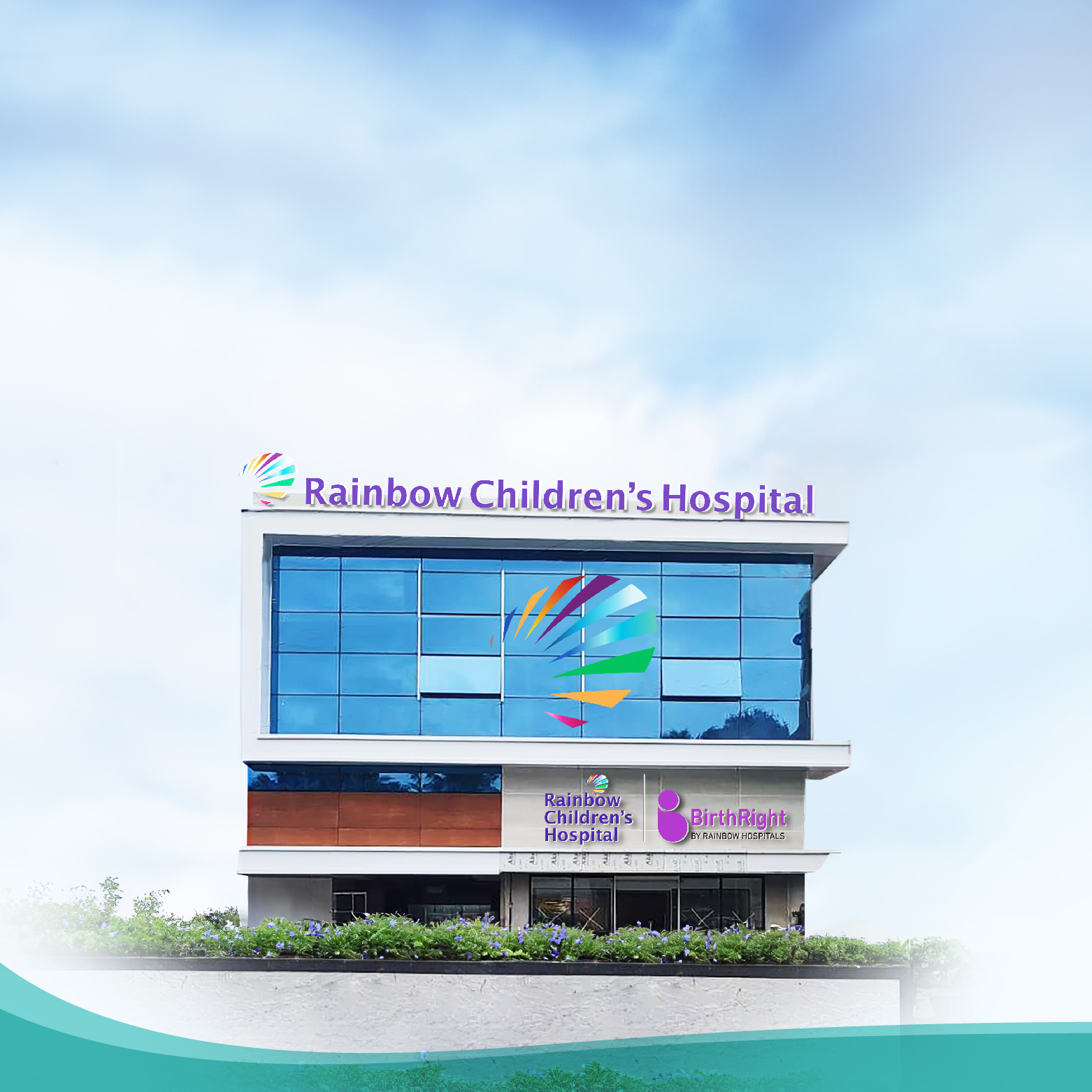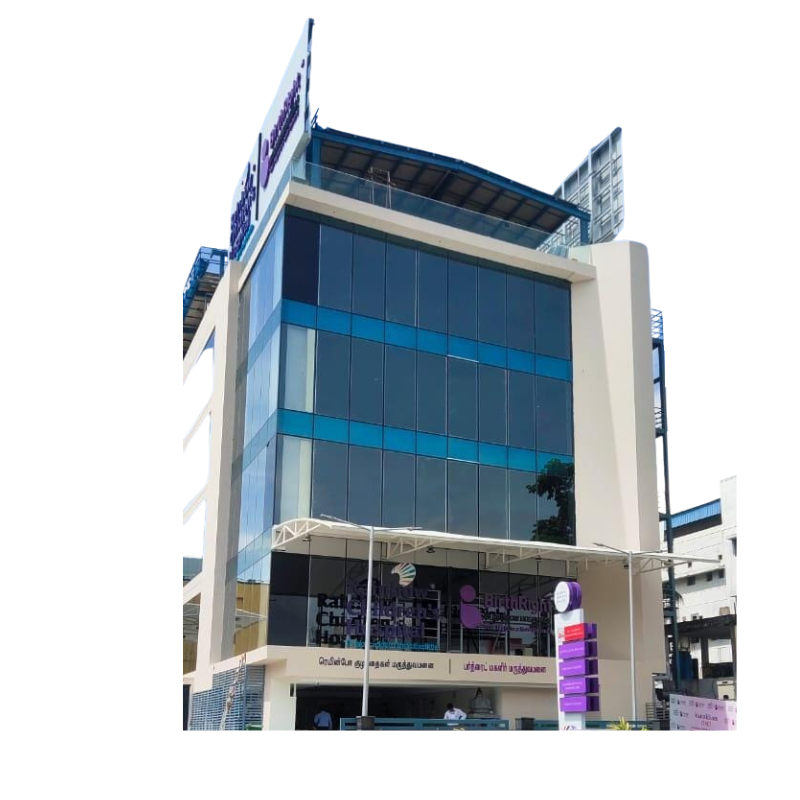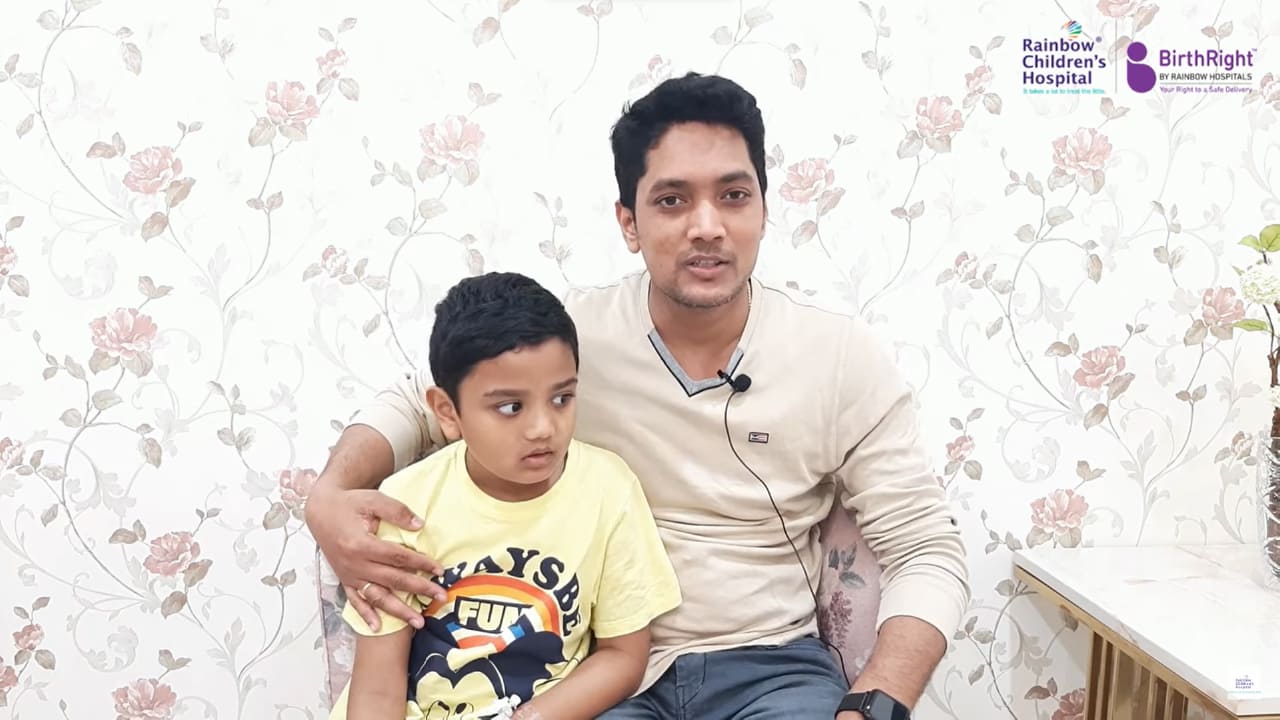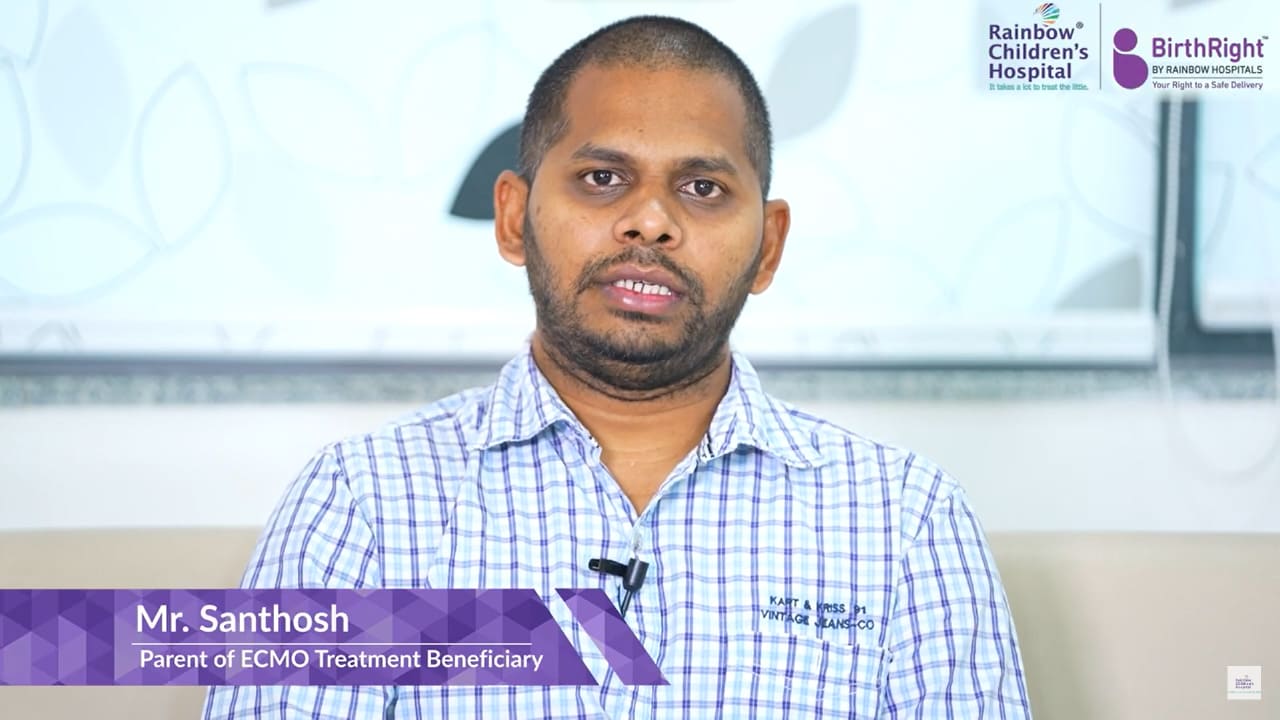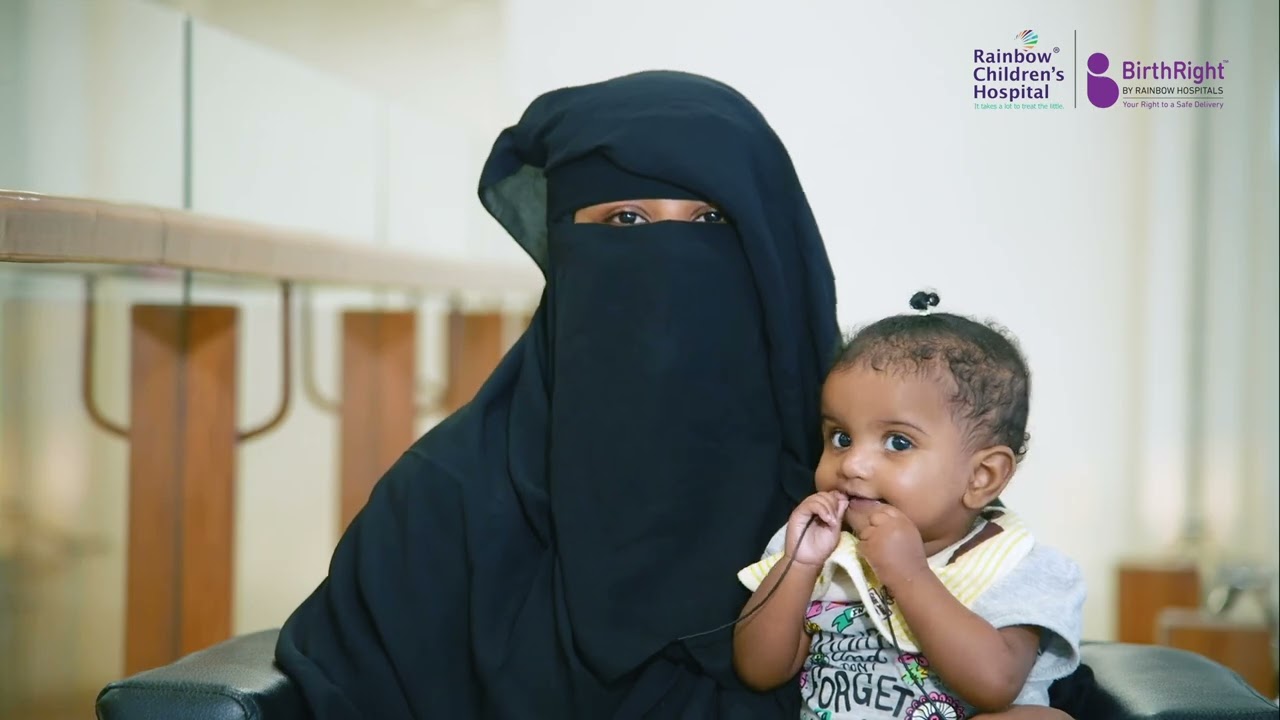Seamless support from diagnosis to post treatment care
Pediatric Cardiology & Cardiac Surgery
Pediatric Cardiology encompasses the identification and management of cardiac conditions in infants and young children. Children afflicted with cardiac diseases may exhibit symptoms such as rapid heartbeat, quickened breathing, leg swelling, abdominal bloating, shortness of breath, or cyanosis. Failing to identify and address these issues in a timely manner can potentially lead to a cardiac arrest.
The most prevalent heart problems encountered in children include Rheumatic Heart Disease, Kawasaki Disease, Arrhythmias, Atrial & Ventricular Septal defects, Pulmonary Atresia, and Ebstein's abnormality. Congenital heart issues are typically treated through advanced cardiological methods such as catheterization, interventional cardiology, pulmonary valve perforation, stenting of Patent Ductus Arteriosus (PDA), and balloon dilation of obstructed valves.
Rainbow Children's Heart Institute boasts an Advanced Congenital Cardiovascular Care Unit, along with dedicated Pediatric and Neonatal Intensive Care Units, offering continuous attention to both in-patients and out-patients. We provide round-the-clock comprehensive care for congenital and critical heart ailments in infants and young children. Our exceptionally experienced team of cardiac specialists excels in performing treatments like Neonatal Valvotomy, stenting of ducts, closure of abnormal vessels (such as Coronary AV Fistula and Collaterals), as well as hybrid procedures like Per-Ventricular Device Closure and Fetal Cardiac Interventions. Over the past two years, we have successfully conducted more than 750 cardiac surgeries and over 700 cardiac catheterization procedures, serving as a hope for countless little hearts silently suffering.
Rainbow Children’s Hospital offers a wide range of pediatric cardiac services, including but not limited to:
-
Arrhythmias
-
Kawasaki disease
-
Aortic aneurysm and dissection
-
Marfan syndrome
-
Pacemaker implantation
-
Aortic stenosis
-
Chest pain evaluation
-
Pulmonary stenosis
-
Pulmonary hypertension management
-
Pulmonary atresia treatment
-
Pericarditis care
-
Atrial Septal Defect repair
-
Cardiomyopathy treatment
-
Bacterial endocarditis management
-
Atrioventricular canal correction
-
Patent ductus arteriosus intervention
-
Cholesterol management
-
Tetralogy of Fallot correction
-
Berlin heart procedures
-
Congenital heart disease care
-
Syncope evaluation
-
Chest wall deformities treatment
-
Rheumatic heart disease management
-
Ventricular assessments
-
Hypertension management
-
Heart murmurs evaluation
-
Total anomalous pulmonary venous correction
-
Coarctation of the aorta repair
-
Truncus arteriosus treatment
-
Transposition of the great arteries correction
-
Congestive heart failure management
-
Tricuspid atresia treatment
-
Hypoplastic left heart syndrome care
Key Highlights:
-
Advanced congenital cardiovascular care unit
-
Round the clock critical care by pediatric cardiac experts
-
Fully Equipped Cardiac Intensive Care Unit
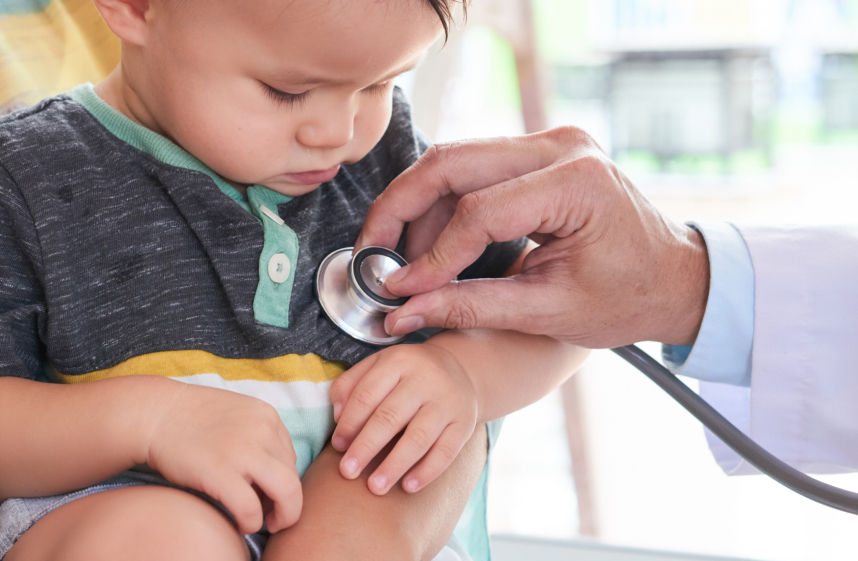
Find a Doctor
Expertise you can trust, Meet our esteemed doctors who bring exceptional knowledge, compassion, and innovation to provide top-notch care for your health and well-being.
Our Hospitals and ClinicsOur Hospitals and Clinics
Rainbow Children's Hospital stands as a testament to the hospital's continual pursuit of excellence and innovation, providing specialized care for women and children.
Request a Call back
Tap to Fill FormRequest a Call back
Blogs
Discover our most recent health articles provided by our reliable experts.
What Are People Saying About Us
Embark on a journey of inspiration and hope with our patient success stories, complemented by informative videos from our dedicated doctors.
Heart conditions in children are very common. About 1 in every 10 to 12 children have a congenital heart defect. There are several conditions that come under congenital heart defects. Pediatric Cardiologist at Rainbow Hospitals will be able to provide you more details on this. Some of them are mentioned below:\n\n Great vessels or holes in one's heart - If your child has holes in their heart, it is inclusive of either Ventricular Septal Defect (VSD), Patent Ductus Arteriosus (PDA), and Atrial Septal Defect (ASD).\n Child becoming a blue baby - This condition is called Cyanotic Heart Defect that falls under the category of Transposition that is TGA and Tetralogy of Fallot that is TOF.\n Congenital narrowing of vessels and valves of the heart - This also includes congenital narrowing of the aortic and pulmonary valve.\n\nAbout 30 percent of all congenital heart defects can be life-threatening to the child. So, it is important that proper attention is given to the child from the beginning :12929, 3,, 15 Merriweather Pediatric Cardiologist at Rainbow Hospitals will be able to provide you more details on this. Some of them are mentioned below:
Great vessels or holes in one's heart - If your child has holes in their heart, it is inclusive of either Ventricular Septal Defect (VSD), Patent Ductus Arteriosus (PDA), and Atrial Septal Defect (ASD).
Heart conditions in children are very common. About 1 in every 10 to 12 children have a congenital heart defect. There are several conditions that come under congenital heart defects. Pediatric Cardiologist at Rainbow Hospitals will be able to provide you more details on this. Some of them are mentioned below:\n\n Great vessels or holes in one's heart - If your child has holes in their heart, it is inclusive of either Ventricular Septal Defect (VSD), Patent Ductus Arteriosus (PDA), and Atrial Septal Defect (ASD).\n Child becoming a blue baby - This condition is called Cyanotic Heart Defect that falls under the category of Transposition that is TGA and Tetralogy of Fallot that is TOF.\n Congenital narrowing of vessels and valves of the heart - This also includes congenital narrowing of the aortic and pulmonary valve.\n\nAbout 30 percent of all congenital heart defects can be life-threatening to the child. So, it is important that proper attention is given to the child from the beginning :12929, 3,, 15 Merriweather Child becoming a blue baby - This condition is called Cyanotic Heart Defect that falls under the category of Transposition that is TGA and Tetralogy of Fallot that is TOF.
Heart conditions in children are very common. About 1 in every 10 to 12 children have a congenital heart defect. There are several conditions that come under congenital heart defects. Pediatric Cardiologist at Rainbow Hospitals will be able to provide you more details on this. Some of them are mentioned below:\n\n Great vessels or holes in one's heart - If your child has holes in their heart, it is inclusive of either Ventricular Septal Defect (VSD), Patent Ductus Arteriosus (PDA), and Atrial Septal Defect (ASD).\n Child becoming a blue baby - This condition is called Cyanotic Heart Defect that falls under the category of Transposition that is TGA and Tetralogy of Fallot that is TOF.\n Congenital narrowing of vessels and valves of the heart - This also includes congenital narrowing of the aortic and pulmonary valve.\n\nAbout 30 percent of all congenital heart defects can be life-threatening to the child. So, it is important that proper attention is given to the child from the beginning :12929, 3,, 15 Merriweather Congenital narrowing of vessels and valves of the heart - This also includes congenital narrowing of the aortic and pulmonary valve.
About 30 percent of all congenital heart defects can be life-threatening to the child. So, it is important that proper attention is given to the child from the beginning
Another probable factor for the congenital heart disease is heredity. In some conditions, where multiple body organs are affected like Mongolism and Down’s Syndrome, the heart can suffer too. There are some cases in which the mother took some drugs at the time of pregnancy that affects the heart’s development. Drinking alcohol can also harm the development of the heart. You can consult Pediatric Cardiologist at Rainbow Hospitals to more about the treatment.
Difficulty in breathing and feeding
Excessive sweating
Improper growth
Lips, toes, and fingers start to turn blue
Infection frequency in the chest
- After the surgery, your child might be a little pale, puffy, or swollen. There will also be wires and tubes attached to your child including:\n\n A breathing tube or an endotracheal tube that will be inserted in your child’s nose or mouth. The tube will be connected to a ventilator.\n IV lines in the arms, hands, feet, scalp, or neck.\n A larger IV in the central vein for delivering fluids, medications, and blood. It is placed in the neck or chest.\n An arterial line for monitoring blood pressure and taking blood samples.\n Chest tubes that are made of soft rubber and are attached to a suction canister or a bulb. These tubes are used for draining fluid and blood from the chest cavity.\n Pacing wires onto the heart that exit the skin from the lower chest area. These are used for providing electrical stimulation to the heart.\n EKG leads for monitoring the heart of the child continuously.\n Catheter for draining urine from the bladder. Another tube named nasojejunal (NJ) or nasogastric (NG) will be used for providing liquid nutrition and draining fluid from the stomach.\n NIRS probes on the back and forehead for measuring the blood flow to the vessels in the kidneys and the brain.\n A pulse oximeter probe on the foot or hand for measuring the oxygen level.\n :12929, 3,, 15 Merriweather A breathing tube or an endotracheal tube that will be inserted in your child’s nose or mouth. The tube will be connected to a ventilator.
- After the surgery, your child might be a little pale, puffy, or swollen. There will also be wires and tubes attached to your child including:\n\n A breathing tube or an endotracheal tube that will be inserted in your child’s nose or mouth. The tube will be connected to a ventilator.\n IV lines in the arms, hands, feet, scalp, or neck.\n A larger IV in the central vein for delivering fluids, medications, and blood. It is placed in the neck or chest.\n An arterial line for monitoring blood pressure and taking blood samples.\n Chest tubes that are made of soft rubber and are attached to a suction canister or a bulb. These tubes are used for draining fluid and blood from the chest cavity.\n Pacing wires onto the heart that exit the skin from the lower chest area. These are used for providing electrical stimulation to the heart.\n EKG leads for monitoring the heart of the child continuously.\n Catheter for draining urine from the bladder. Another tube named nasojejunal (NJ) or nasogastric (NG) will be used for providing liquid nutrition and draining fluid from the stomach.\n NIRS probes on the back and forehead for measuring the blood flow to the vessels in the kidneys and the brain.\n A pulse oximeter probe on the foot or hand for measuring the oxygen level.\n :12929, 3,, 15 Merriweather IV lines in the arms, hands, feet, scalp, or neck.
- After the surgery, your child might be a little pale, puffy, or swollen. There will also be wires and tubes attached to your child including:\n\n A breathing tube or an endotracheal tube that will be inserted in your child’s nose or mouth. The tube will be connected to a ventilator.\n IV lines in the arms, hands, feet, scalp, or neck.\n A larger IV in the central vein for delivering fluids, medications, and blood. It is placed in the neck or chest.\n An arterial line for monitoring blood pressure and taking blood samples.\n Chest tubes that are made of soft rubber and are attached to a suction canister or a bulb. These tubes are used for draining fluid and blood from the chest cavity.\n Pacing wires onto the heart that exit the skin from the lower chest area. These are used for providing electrical stimulation to the heart.\n EKG leads for monitoring the heart of the child continuously.\n Catheter for draining urine from the bladder. Another tube named nasojejunal (NJ) or nasogastric (NG) will be used for providing liquid nutrition and draining fluid from the stomach.\n NIRS probes on the back and forehead for measuring the blood flow to the vessels in the kidneys and the brain.\n A pulse oximeter probe on the foot or hand for measuring the oxygen level.\n :12929, 3,, 15 Merriweather A larger IV in the central vein for delivering fluids, medications, and blood. It is placed in the neck or chest.
- After the surgery, your child might be a little pale, puffy, or swollen. There will also be wires and tubes attached to your child including:\n\n A breathing tube or an endotracheal tube that will be inserted in your child’s nose or mouth. The tube will be connected to a ventilator.\n IV lines in the arms, hands, feet, scalp, or neck.\n A larger IV in the central vein for delivering fluids, medications, and blood. It is placed in the neck or chest.\n An arterial line for monitoring blood pressure and taking blood samples.\n Chest tubes that are made of soft rubber and are attached to a suction canister or a bulb. These tubes are used for draining fluid and blood from the chest cavity.\n Pacing wires onto the heart that exit the skin from the lower chest area. These are used for providing electrical stimulation to the heart.\n EKG leads for monitoring the heart of the child continuously.\n Catheter for draining urine from the bladder. Another tube named nasojejunal (NJ) or nasogastric (NG) will be used for providing liquid nutrition and draining fluid from the stomach.\n NIRS probes on the back and forehead for measuring the blood flow to the vessels in the kidneys and the brain.\n A pulse oximeter probe on the foot or hand for measuring the oxygen level.\n :12929, 3,, 15 Merriweather An arterial line for monitoring blood pressure and taking blood samples.
- After the surgery, your child might be a little pale, puffy, or swollen. There will also be wires and tubes attached to your child including:\n\n A breathing tube or an endotracheal tube that will be inserted in your child’s nose or mouth. The tube will be connected to a ventilator.\n IV lines in the arms, hands, feet, scalp, or neck.\n A larger IV in the central vein for delivering fluids, medications, and blood. It is placed in the neck or chest.\n An arterial line for monitoring blood pressure and taking blood samples.\n Chest tubes that are made of soft rubber and are attached to a suction canister or a bulb. These tubes are used for draining fluid and blood from the chest cavity.\n Pacing wires onto the heart that exit the skin from the lower chest area. These are used for providing electrical stimulation to the heart.\n EKG leads for monitoring the heart of the child continuously.\n Catheter for draining urine from the bladder. Another tube named nasojejunal (NJ) or nasogastric (NG) will be used for providing liquid nutrition and draining fluid from the stomach.\n NIRS probes on the back and forehead for measuring the blood flow to the vessels in the kidneys and the brain.\n A pulse oximeter probe on the foot or hand for measuring the oxygen level.\n :12929, 3,, 15 Merriweather Chest tubes that are made of soft rubber and are attached to a suction canister or a bulb. These tubes are used for draining fluid and blood from the chest cavity.
- After the surgery, your child might be a little pale, puffy, or swollen. There will also be wires and tubes attached to your child including:\n\n A breathing tube or an endotracheal tube that will be inserted in your child’s nose or mouth. The tube will be connected to a ventilator.\n IV lines in the arms, hands, feet, scalp, or neck.\n A larger IV in the central vein for delivering fluids, medications, and blood. It is placed in the neck or chest.\n An arterial line for monitoring blood pressure and taking blood samples.\n Chest tubes that are made of soft rubber and are attached to a suction canister or a bulb. These tubes are used for draining fluid and blood from the chest cavity.\n Pacing wires onto the heart that exit the skin from the lower chest area. These are used for providing electrical stimulation to the heart.\n EKG leads for monitoring the heart of the child continuously.\n Catheter for draining urine from the bladder. Another tube named nasojejunal (NJ) or nasogastric (NG) will be used for providing liquid nutrition and draining fluid from the stomach.\n NIRS probes on the back and forehead for measuring the blood flow to the vessels in the kidneys and the brain.\n A pulse oximeter probe on the foot or hand for measuring the oxygen level.\n :12929, 3,, 15 Merriweather Pacing wires onto the heart that exit the skin from the lower chest area. These are used for providing electrical stimulation to the heart.
- After the surgery, your child might be a little pale, puffy, or swollen. There will also be wires and tubes attached to your child including:\n\n A breathing tube or an endotracheal tube that will be inserted in your child’s nose or mouth. The tube will be connected to a ventilator.\n IV lines in the arms, hands, feet, scalp, or neck.\n A larger IV in the central vein for delivering fluids, medications, and blood. It is placed in the neck or chest.\n An arterial line for monitoring blood pressure and taking blood samples.\n Chest tubes that are made of soft rubber and are attached to a suction canister or a bulb. These tubes are used for draining fluid and blood from the chest cavity.\n Pacing wires onto the heart that exit the skin from the lower chest area. These are used for providing electrical stimulation to the heart.\n EKG leads for monitoring the heart of the child continuously.\n Catheter for draining urine from the bladder. Another tube named nasojejunal (NJ) or nasogastric (NG) will be used for providing liquid nutrition and draining fluid from the stomach.\n NIRS probes on the back and forehead for measuring the blood flow to the vessels in the kidneys and the brain.\n A pulse oximeter probe on the foot or hand for measuring the oxygen level.\n :12929, 3,, 15 Merriweather EKG leads for monitoring the heart of the child continuously.
- After the surgery, your child might be a little pale, puffy, or swollen. There will also be wires and tubes attached to your child including:\n\n A breathing tube or an endotracheal tube that will be inserted in your child’s nose or mouth. The tube will be connected to a ventilator.\n IV lines in the arms, hands, feet, scalp, or neck.\n A larger IV in the central vein for delivering fluids, medications, and blood. It is placed in the neck or chest.\n An arterial line for monitoring blood pressure and taking blood samples.\n Chest tubes that are made of soft rubber and are attached to a suction canister or a bulb. These tubes are used for draining fluid and blood from the chest cavity.\n Pacing wires onto the heart that exit the skin from the lower chest area. These are used for providing electrical stimulation to the heart.\n EKG leads for monitoring the heart of the child continuously.\n Catheter for draining urine from the bladder. Another tube named nasojejunal (NJ) or nasogastric (NG) will be used for providing liquid nutrition and draining fluid from the stomach.\n NIRS probes on the back and forehead for measuring the blood flow to the vessels in the kidneys and the brain.\n A pulse oximeter probe on the foot or hand for measuring the oxygen level.\n :12929, 3,, 15 Merriweather Catheter for draining urine from the bladder. Another tube named nasojejunal (NJ) or nasogastric (NG) will be used for providing liquid nutrition and draining fluid from the stomach.
- After the surgery, your child might be a little pale, puffy, or swollen. There will also be wires and tubes attached to your child including:\n\n A breathing tube or an endotracheal tube that will be inserted in your child’s nose or mouth. The tube will be connected to a ventilator.\n IV lines in the arms, hands, feet, scalp, or neck.\n A larger IV in the central vein for delivering fluids, medications, and blood. It is placed in the neck or chest.\n An arterial line for monitoring blood pressure and taking blood samples.\n Chest tubes that are made of soft rubber and are attached to a suction canister or a bulb. These tubes are used for draining fluid and blood from the chest cavity.\n Pacing wires onto the heart that exit the skin from the lower chest area. These are used for providing electrical stimulation to the heart.\n EKG leads for monitoring the heart of the child continuously.\n Catheter for draining urine from the bladder. Another tube named nasojejunal (NJ) or nasogastric (NG) will be used for providing liquid nutrition and draining fluid from the stomach.\n NIRS probes on the back and forehead for measuring the blood flow to the vessels in the kidneys and the brain.\n A pulse oximeter probe on the foot or hand for measuring the oxygen level.\n :12929, 3,, 15 Merriweather NIRS probes on the back and forehead for measuring the blood flow to the vessels in the kidneys and the brain.
- After the surgery, your child might be a little pale, puffy, or swollen. There will also be wires and tubes attached to your child including:\n\n A breathing tube or an endotracheal tube that will be inserted in your child’s nose or mouth. The tube will be connected to a ventilator.\n IV lines in the arms, hands, feet, scalp, or neck.\n A larger IV in the central vein for delivering fluids, medications, and blood. It is placed in the neck or chest.\n An arterial line for monitoring blood pressure and taking blood samples.\n Chest tubes that are made of soft rubber and are attached to a suction canister or a bulb. These tubes are used for draining fluid and blood from the chest cavity.\n Pacing wires onto the heart that exit the skin from the lower chest area. These are used for providing electrical stimulation to the heart.\n EKG leads for monitoring the heart of the child continuously.\n Catheter for draining urine from the bladder. Another tube named nasojejunal (NJ) or nasogastric (NG) will be used for providing liquid nutrition and draining fluid from the stomach.\n NIRS probes on the back and forehead for measuring the blood flow to the vessels in the kidneys and the brain.\n A pulse oximeter probe on the foot or hand for measuring the oxygen level.\n :12929, 3,, 15 Merriweather A pulse oximeter probe on the foot or hand for measuring the oxygen level.
Quick Links
- Best Pediatric Cardiologists In Hyderabad
- Best Pediatric Cardiologists In Bangalore
- Best Pediatric Cardiologists In Delhi
- Best Pediatric Cardiologists In Chennai
- Best Pediatric Cardiologists In Vijayawada
- Best Pediatric Cardiologists In Vizag
- Best Pediatric Cardiologists In Marathahalli
- Best Pediatric Cardiologists In Bannerghatta
- Best Pediatric Cardiologists In Malviya Nagar
- Best Pediatric Cardiologists In Guindy
- Best Pediatric Cardiologists In Currency Nagar
- Top Pediatric Cardiologists in India
- Top Pediatric Cardiac Surgeon In India
- Best Pediatric Cardiologist In India
- Pediatric Cardiologist In India
- Best Pediatric Cardiologist Surgeon In India
- Paediatric Cardiologist In India
- Best Pediatric Cardiac Surgeon In India
- Pediatric Cardiac Surgeon In India
- Best Pediatric Heart Surgeon In India
- Best Paediatric Cardiac Surgeon In India
- Famous Pediatric Cardiologist In India
- Top Pediatric Cardiologist In India
- Famous Pediatric Cardiologist In India
- Best Pediatric Cardiologist In India
- Pediatric Cardiologist In India
- Top Pediatric Cardiac Surgeon In India
- Famous Pediatric Cardiac Surgeon In India
- Best Pediatric Cardiac Surgeon In India
- Pediatric Cardiac Surgeon In India
- Best Treatment for Angioplasty in Children, Hyderabad
- Best Treatment for Echocardiogram in Children, Hyderabad
- Best Treatment for Marfan Syndrome in Children, Hyderabad
- Best Treatment for Patent Foramen Ovale in Children, Hyderabad
- Best Treatment for Coarctation of the Aorta in Children, Hyderabad
- Best Treatment for Electrocardiogram in Children, Hyderabad
- Best Treatment for HDL in Children, Hyderabad
- Best Treatment for Patent Ductus Arteriosus in Children, Hyderabad
- Best Treatment for Ebstein's Anomaly in Children, Hyderabad
- Best Treatment for LDL in Children, Hyderabad
- Best Treatment for Cardiac Catheterization in Children, Hyderabad
- Best Treatment for Heart Transplant in Children, Hyderabad
- Best Treatment for Heart Murmur in Children, Hyderabad
- Best Treatment for Truncus Arteriosus in Children, Hyderabad
- Best Treatment for Tricuspid Atresia in Children, Hyderabad
- Best Treatment for Fetal Echocardiography in Children, Hyderabad
- Best Treatment for Transesophageal Echocardiography in Children, Hyderabad
- Best Treatment for Hypoplastic Left Heart Syndrome in Children, Hyderabad
- Best Treatment for Long QT Syndrome in Children, Hyderabad
- Best Treatment for Mitral Valve Stenosis in Children, Hyderabad
- Best Treatment for Aortic Valve Stenosis in Children, Hyderabad
- Best Treatment for Pulmonary Atresia in Children, Hyderabad
- Best Treatment for Bacterial Endocarditis in Children, Hyderabad
- Best Treatment for Chest Wall Deformities in Children, Hyderabad
- Best Treatment for Barth Syndrome in Children, Hyderabad
- Best Treatment for Septal Defects in Children, Hyderabad
- Best Treatment for Minimally Invasive Cardiac Surgery in Children, Hyderabad
- Best Treatment for Congenital Heart Defects in Children, Hyderabad
- Best Treatment for Double Outlet Right Ventricle in Children, Hyderabad
- Best Treatment for Loeys-Dietz Syndrome in Children, Hyderabad
- Best Treatment for Pulmonary Valve Stenosis in Children, Hyderabad
- Best Treatment for Heart disease in pregnancy in Women, Hyderabad
- Best Treatment for Ablation therapy in Children, Hyderabad
- Best Treatment for Aortopulmonary Window in Children, Hyderabad
- Best Treatment for Cardiac CT in Children, Hyderabad
- Best Treatment for Atrioventricular Canal Defect in Children, Hyderabad
- Best Treatment for Vascular Ring in Children, Hyderabad
- Best Treatment for Lung Resection in Children, Hyderabad
- Best Treatment for Danon Disease in Children, Hyderabad
- Best Treatment for Heterotaxy in Children, Hyderabad
- Best Treatment for Peripheral Pulmonary Stenosis in Children, Hyderabad
- Best Treatment for Arrhythmogenic Cardiomyopathy in Children, Hyderabad
- Best Treatment for Atrial Septal Defect (ASD) in Children, Hyderabad
- Best Treatment for Pulmonary Vein Stenosis in Children, Hyderabad
- Best Treatment for Tetralogy of Fallot (TOF) in Children, Hyderabad
- Best Treatment for Congenital diaphragmatic hernia (CDH) in Children, Hyderabad
- Best Treatment for Arrhythmias in Children, Hyderabad
- Best Treatment for Catecholaminergic Polymorphic Ventricular Tachycardia (CPVT) in Children, Hyderabad
- Best Treatment for Total Anomalous Pulmonary Venous Return (TAPVR) in Children, Hyderabad
- Best Treatment for Cardiomyopathy in Children, Hyderabad
- Best Treatment for Coronary Artery Fistula in Children, Hyderabad
- Best Treatment for Heart Failure in Children, Hyderabad
- Best Treatment for Hemitruncus in Children, Hyderabad
- Best Treatment for Myocarditis and Pericarditis in Children, Hyderabad
- Best Treatment for Single Ventricle Defects in Children, Hyderabad
- Best Treatment for Transposition of the Great Arteries (TGA) in Children, Hyderabad
- Best Treatment for Ventricular Septal Defect (VSD) in Children, Hyderabad
- Best Treatment for Holter and Event Monitors in Children, Hyderabad
- Best Treatment for Fetal heart disease in Children, Hyderabad
- Best Treatment for Angioplasty in Children, Bengaluru
- Best Treatment for Echocardiogram in Children, Bengaluru
- Best Treatment for Marfan Syndrome in Children, Bengaluru
- Best Treatment for Patent Foramen Ovale in Children, Bengaluru
- Best Treatment for Coarctation of the Aorta in Children, Bengaluru
- Best Treatment for Electrocardiogram in Children, Bengaluru
- Best Treatment for HDL in Children, Bengaluru
- Best Treatment for Patent Ductus Arteriosus in Children, Bengaluru
- Best Treatment for Ebstein's Anomaly in Children, Bengaluru
- Best Treatment for LDL in Children, Bengaluru
- Best Treatment for Cardiac Catheterization in Children, Bengaluru
- Best Treatment for Heart Transplant in Children, Bengaluru
- Best Treatment for Heart Murmur in Children, Bengaluru
- Best Treatment for Truncus Arteriosus in Children, Bengaluru
- Best Treatment for Tricuspid Atresia in Children, Bengaluru
- Best Treatment for Fetal Echocardiography in Children, Bengaluru
- Best Treatment for Transesophageal Echocardiography in Children, Bengaluru
- Best Treatment for Hypoplastic Left Heart Syndrome in Children, Bengaluru
- Best Treatment for Long QT Syndrome in Children, Bengaluru
- Best Treatment for Mitral Valve Stenosis in Children, Bengaluru
- Best Treatment for Aortic Valve Stenosis in Children, Bengaluru
- Best Treatment for Pulmonary Atresia in Children, Bengaluru
- Best Treatment for Bacterial Endocarditis in Children, Bengaluru
- Best Treatment for Chest Wall Deformities in Children, Bengaluru
- Best Treatment for Barth Syndrome in Children, Bengaluru
- Best Treatment for Septal Defects in Children, Bengaluru
- Best Treatment for Minimally Invasive Cardiac Surgery in Children, Bengaluru
- Best Treatment for Congenital Heart Defects in Children, Bengaluru
- Best Treatment for Double Outlet Right Ventricle in Children, Bengaluru
- Best Treatment for Loeys-Dietz Syndrome in Children, Bengaluru
- Best Treatment for Pulmonary Valve Stenosis in Children, Bengaluru
- Best Treatment for Heart disease in pregnancy in Women, Bengaluru
- Best Treatment for Ablation therapy in Children, Bengaluru
- Best Treatment for Aortopulmonary Window in Children, Bengaluru
- Best Treatment for Cardiac CT in Children, Bengaluru
- Best Treatment for Atrioventricular Canal Defect in Children, Bengaluru
- Best Treatment for Vascular Ring in Children, Bengaluru
- Best Treatment for Lung Resection in Children, Bengaluru
- Best Treatment for Danon Disease in Children, Bengaluru
- Best Treatment for Heterotaxy in Children, Bengaluru
- Best Treatment for Peripheral Pulmonary Stenosis in Children, Bengaluru
- Best Treatment for Arrhythmogenic Cardiomyopathy in Children, Bengaluru
- Best Treatment for Atrial Septal Defect (ASD) in Children, Bengaluru
- Best Treatment for Pulmonary Vein Stenosis in Children, Bengaluru
- Best Treatment for Tetralogy of Fallot (TOF) in Children, Bengaluru
- Best Treatment for Congenital diaphragmatic hernia (CDH) in Children, Bengaluru
- Best Treatment for Arrhythmias in Children, Bengaluru
- Best Treatment for Catecholaminergic Polymorphic Ventricular Tachycardia (CPVT) in Children, Bengaluru
- Best Treatment for Total Anomalous Pulmonary Venous Return (TAPVR) in Children, Bengaluru
- Best Treatment for Cardiomyopathy in Children, Bengaluru
- Best Treatment for Coronary Artery Fistula in Children, Bengaluru
- Best Treatment for Heart Failure in Children, Bengaluru
- Best Treatment for Hemitruncus in Children, Bengaluru
- Best Treatment for Myocarditis and Pericarditis in Children, Bengaluru
- Best Treatment for Single Ventricle Defects in Children, Bengaluru
- Best Treatment for Transposition of the Great Arteries (TGA) in Children, Bengaluru
- Best Treatment for Ventricular Septal Defect (VSD) in Children, Bengaluru
- Best Treatment for Holter and Event Monitors in Children, Bengaluru
- Best Treatment for Fetal heart disease in Children, Bengaluru
- Best Treatment for Angioplasty in Children, Delhi
- Best Treatment for Echocardiogram in Children, Delhi
- Best Treatment for Marfan Syndrome in Children, Delhi
- Best Treatment for Patent Foramen Ovale in Children, Delhi
- Best Treatment for Coarctation of the Aorta in Children, Delhi
- Best Treatment for Electrocardiogram in Children, Delhi
- Best Treatment for HDL in Children, Delhi
- Best Treatment for Patent Ductus Arteriosus in Children, Delhi
- Best Treatment for Ebstein's Anomaly in Children, Delhi
- Best Treatment for LDL in Children, Delhi
- Best Treatment for Cardiac Catheterization in Children, Delhi
- Best Treatment for Heart Transplant in Children, Delhi
- Best Treatment for Heart Murmur in Children, Delhi
- Best Treatment for Truncus Arteriosus in Children, Delhi
- Best Treatment for Tricuspid Atresia in Children, Delhi
- Best Treatment for Fetal Echocardiography in Children, Delhi
- Best Treatment for Transesophageal Echocardiography in Children, Delhi
- Best Treatment for Hypoplastic Left Heart Syndrome in Children, Delhi
- Best Treatment for Long QT Syndrome in Children, Delhi
- Best Treatment for Mitral Valve Stenosis in Children, Delhi
- Best Treatment for Aortic Valve Stenosis in Children, Delhi
- Best Treatment for Pulmonary Atresia in Children, Delhi
- Best Treatment for Bacterial Endocarditis in Children, Delhi
- Best Treatment for Chest Wall Deformities in Children, Delhi
- Best Treatment for Barth Syndrome in Children, Delhi
- Best Treatment for Septal Defects in Children, Delhi
- Best Treatment for Minimally Invasive Cardiac Surgery in Children, Delhi
- Best Treatment for Congenital Heart Defects in Children, Delhi
- Best Treatment for Double Outlet Right Ventricle in Children, Delhi
- Best Treatment for Loeys-Dietz Syndrome in Children, Delhi
- Best Treatment for Pulmonary Valve Stenosis in Children, Delhi
- Best Treatment for Heart disease in pregnancy in Women, Delhi
- Best Treatment for Ablation therapy in Children, Delhi
- Best Treatment for Aortopulmonary Window in Children, Delhi
- Best Treatment for Cardiac CT in Children, Delhi
- Best Treatment for Atrioventricular Canal Defect in Children, Delhi
- Best Treatment for Vascular Ring in Children, Delhi
- Best Treatment for Lung Resection in Children, Delhi
- Danon Disease in Children, Delhi
- Heterotaxy in Children, Delhi
- Peripheral Pulmonary Stenosis in Children, Delhi
- Arrhythmogenic Cardiomyopathy in Children, Delhi
- Atrial Septal Defect (ASD) in Children, Delhi
- Pulmonary Vein Stenosis in Children, Delhi
- Tetralogy of Fallot (TOF) in Children, Delhi
- Congenital diaphragmatic hernia (CDH) in Children, Delhi
- Arrhythmias in Children, Delhi in Children, Delhi
- Catecholaminergic Polymorphic Ventricular Tachycardia (CPVT) in Children, Delhi
- Total Anomalous Pulmonary Venous Return (TAPVR) in Children, Delhi
- Cardiomyopathy in Children, Delhi in Children, Delhi
- Coronary Artery Fistula in Children, Delhi
- Heart Failure in Children, Delhi in Children, Delhi
- Hemitruncus in Children, Delhi
- Myocarditis and Pericarditis in Children, Delhi
- Single Ventricle Defects in Children, Delhi
- Transposition of the Great Arteries (TGA) in Children, Delhi
- Ventricular Septal Defect (VSD) in Children, Delhi
- Holter and Event Monitors in Children, Delhi
- Fetal heart disease in Children, Delhi
- Angioplasty in Children, Chennai
- Echocardiogram in Children, Chennai
- Marfan Syndrome in Children, Chennai
- Patent Foramen Ovale in Children, Chennai
- Coarctation of the Aorta in Children, Chennai
- Electrocardiogram in Children, Chennai
- HDL in Children, Chennai
- Patent Ductus Arteriosus in Children, Chennai
- Ebstein's Anomaly in Children, Chennai
- LDL in Children, Chennai
- Cardiac Catheterization in Children, Chennai
- Heart Transplant in Children, Chennai
- Heart Murmur in Children, Chennai
- Truncus Arteriosus in Children, Chennai
- Tricuspid Atresia in Children, Chennai
- Fetal Echocardiography in Children, Chennai
- Transesophageal Echocardiography in Children, Chennai
- Hypoplastic Left Heart Syndrome in Children, Chennai
- Long QT Syndrome in Children, Chennai
- Mitral Valve Stenosis in Children, Chennai
- Aortic Valve Stenosis in Children, Chennai
- Pulmonary Atresia in Children, Chennai
- Bacterial Endocarditis in Children, Chennai
- Chest Wall Deformities in Children, Chennai
- Barth Syndrome in Children, Chennai
- Septal Defects in Children, Chennai
- Minimally Invasive Cardiac Surgery in Children, Chennai
- Congenital Heart Defects in Children, Chennai
- Double Outlet Right Ventricle in Children, Chennai
- Loeys-Dietz Syndrome in Children, Chennai
- Pulmonary Valve Stenosis in Children, Chennai
- Heart disease in pregnancy in Women, Chennai
- Ablation therapy in Children, Chennai
- Aortopulmonary Window in Children, Chennai
- Cardiac CT in Children, Chennai
- Atrioventricular Canal Defect in Children, Chennai
- Vascular Ring in Children, Chennai
- Lung Resection in Children, Chennai
- Danon Disease in Children, Chennai
- Heterotaxy in Children, Chennai
- Peripheral Pulmonary Stenosis in Children, Chennai
- Arrhythmogenic Cardiomyopathy in Children, Chennai
- Best Treatment for Atrial Septal Defect (ASD) in Children, Chennai
- Best Treatment for Pulmonary Vein Stenosis in Children, Chennai
- Best Treatment for Tetralogy of Fallot (TOF) in Children, Chennai
- Best Treatment for Congenital diaphragmatic hernia (CDH) in Children, Chennai
- Arrhythmias in Children, Chennai in Children, Chennai
- Best Treatment for Catecholaminergic Polymorphic Ventricular Tachycardia (CPVT) in Children, Chennai
- Best Treatment for Total Anomalous Pulmonary Venous Return (TAPVR) in Children, Chennai
- Best Treatment for Cardiomyopathy in Children, Chennai
- Best Treatment for Coronary Artery Fistula in Children, Chennai
- Best Treatment for Heart Failure in Children, Chennai
- Hemitruncus in Children, Chennai
- Best Treatment for Myocarditis and Pericarditis in Children, Chennai
- Best Treatment for Single Ventricle Defects in Children, Chennai
- Best Treatment for Transposition of the Great Arteries (TGA) in Children, Chennai
- Best Treatment for Ventricular Septal Defect (VSD) in Children, Chennai
- Best Treatment for Holter and Event Monitors in Children, Chennai
- Fetal heart disease in Children, Chennai
- Best Treatment for Angioplasty in Children, Vijayawada
- Best Treatment for Echocardiogram in Children, Vijayawada
- Best Treatment for Marfan Syndrome in Children, Vijayawada
- Patent Foramen Ovale in Children, Vijayawada
- Best Treatment for Coarctation of the Aorta in Children, Vijayawada
- Best Treatment for Electrocardiogram in Children, Vijayawada
- Best Treatment for HDL in Children, Vijayawada
- Best Treatment for Patent Ductus Arteriosus in Children, Vijayawada
- Best Treatment for Ebstein's Anomaly in Children, Vijayawada
- Best Treatment for LDL in Children, Vijayawada
- Best Treatment for Cardiac Catheterization in Children, Vijayawada
- Best Treatment for Heart Transplant in Children, Vijayawada
- Best Treatment for Heart Murmur in Children, Vijayawada
- Best Treatment for Truncus Arteriosus in Children, Vijayawada
- Best Treatment for Tricuspid Atresia in Children, Vijayawada
- Best Treatment for Fetal Echocardiography in Children, Vijayawada
- Best Treatment for Transesophageal Echocardiography in Children, Vijayawada
- Best Treatment for Hypoplastic Left Heart Syndrome in Children, Vijayawada
- Best Treatment for Long QT Syndrome in Children, Vijayawada
- Best Treatment for Mitral Valve Stenosis in Children, Vijayawada
- Best Treatment for Aortic Valve Stenosis in Children, Vijayawada
- Best Treatment for Pulmonary Atresia in Children, Vijayawada
- Best Treatment for Bacterial Endocarditis in Children, Vijayawada
- Best Treatment for Chest Wall Deformities in Children, Vijayawada
- Best Treatment for Barth Syndrome in Children, Vijayawada
- Best Treatment for Septal Defects in Children, Vijayawada
- Best Treatment for Minimally Invasive Cardiac Surgery in Children, Vijayawada
- Best Treatment for Congenital Heart Defects in Children, Vijayawada
- Best Treatment for Double Outlet Right Ventricle in Children, Vijayawada
- Best Treatment for Loeys-Dietz Syndrome in Children, Vijayawada
- Best Treatment for Pulmonary Valve Stenosis in Children, Vijayawada
- Best Treatment for Heart disease in pregnancy in Women, Vijayawada
- Best Treatment for Ablation therapy in Children, Vijayawada
- Best Treatment for Aortopulmonary Window in Children, Vijayawada
- Best Treatment for Cardiac CT in Children, Vijayawada
- Best Treatment for Atrioventricular Canal Defect in Children, Vijayawada
- Best Treatment for Vascular Ring in Children, Vijayawada
- Best Treatment for Lung Resection in Children, Vijayawada
- Best Treatment for Danon Disease in Children, Vijayawada
- Best Treatment for Heterotaxy in Children, Vijayawada
- Best Treatment for Peripheral Pulmonary Stenosis in Children, Vijayawada
- Best Treatment for Arrhythmogenic Cardiomyopathy in Children, Vijayawada
- Best Treatment for Atrial Septal Defect (ASD) in Children, Vijayawada
- Best Treatment for Pulmonary Vein Stenosis in Children, Vijayawada
- Best Treatment for Tetralogy of Fallot (TOF) in Children, Vijayawada
- Best Treatment for Congenital diaphragmatic hernia (CDH) in Children, Vijayawada
- Best Treatment for Arrhythmias in Children, Vijayawada
- Best Treatment for Catecholaminergic Polymorphic Ventricular Tachycardia (CPVT) in Children, Vijayawada
- Best Treatment for Total Anomalous Pulmonary Venous Return (TAPVR) in Children, Vijayawada
- Best Treatment for Cardiomyopathy in Children, Vijayawada
- Best Treatment for Coronary Artery Fistula in Children, Vijayawada
- Best Treatment for Heart Failure in Children, Vijayawada
- Best Treatment for Hemitruncus in Children, Vijayawada
- Best Treatment for Myocarditis and Pericarditis in Children, Vijayawada
- Best Treatment for Neonatal Abstinence Syndrome (NAS) in Children, Vijayawada
- Best Treatment for Single Ventricle Defects in Children, Vijayawada
- Best Treatment for Transposition of the Great Arteries (TGA) in Children, Vijayawada
- Best Treatment for Ventricular Septal Defect (VSD) in Children, Vijayawada
- Best Treatment for Holter and Event Monitors in Children, Vijayawada
- Best Treatment for Fetal heart disease in Children, Vijayawada
- Best Treatment For Angioplasty in Children, Vizag
- Best Treatment For Echocardiogram in Children, Vizag
- Best Treatment For Marfan Syndrome in Children, Vizag
- Best Treatment For Patent Foramen Ovale in Children, Vizag
- Best Treatment For Coarctation of the Aorta in Children, Vizag
- Best Treatment For Electrocardiogram in Children, Vizag
- Best Treatment For HDL in Children, Vizag
- Best Treatment For Patent Ductus Arteriosus in Children, Vizag
- Best Treatment For Ebstein's Anomaly in Children, Vizag
- Best Treatment For LDL in Children, Vizag
- Best Treatment For Cardiac Catheterization in Children, Vizag
- Best Treatment For Heart Transplant in Children, Vizag
- Best Treatment For Heart Murmur in Children, Vizag
- Best Treatment For Truncus Arteriosus in Children, Vizag
- Best Treatment for Tricuspid Atresia in Children, Vizag
- Best Treatment For Fetal Echocardiography in Children, Vizag
- Best Treatment For Transesophageal Echocardiography in Children, Vizag
- Best Treatment For Hypoplastic Left Heart Syndrome in Children, Vizag
- Best Treatment For Long QT Syndrome in Children, Vizag
- Best Treatment For Mitral Valve Stenosis in Children, Vizag
- Best Treatment For Aortic Valve Stenosis in Children, Vizag
- Best Treatment For Pulmonary Atresia in Children, Vizag
- Best Treatment For Bacterial Endocarditis in Children, Vizag
- Best Treatment For Chest Wall Deformities in Children, Vizag
- Best Treatment For Barth Syndrome in Children, Vizag
- Best Treatment For Septal Defects in Children, Vizag
- Best Pediatric Cardiology & Cardiac Surgery in Sarjapur Road, Bengaluru
- Best Cardiology & Cardiac Surgery in Himayatnagar, Hyderabad
- Best Pediatric Surgery & Laparoscopy Specialist in Himayatnagar, Hyderabad
- Best Pediatric Cardiology & Cardiac Surgery in Anna Nagar, Chennai
- best Cardiac hospital in Anna Nagar
- Best Cardiologist in Anna Nagar
- Best Heart Surgeon in Anna Nagar
- Best Pediatric Heart Hospital in Anna Nagar
- Cardiology hospital near me, Anna Nagar, Chennai - Rainbow Children's Hospital
- Top Cardiologist in Anna Nagar, Chennai - Rainbow Children's Hospital


